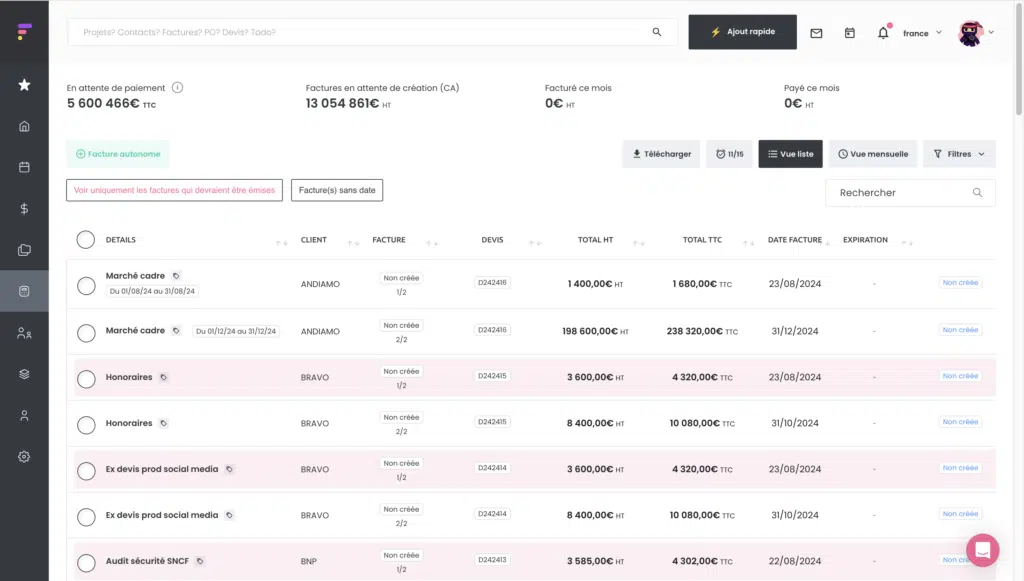ERP (Enterprise Resource Planning) is much more than just management software. It’s an integrated platform that centralizes all your company’s key functions, from accounting to production and human resources.
ERP helps you harmonize processes, reduce costs, and anticipate the future with informed decisions. So, whether you’re running an SME or a large corporation, it’s time to find out how an ERP can truly revolutionize the way you work.
What is ERP?
ERP (Enterprise Resource Planning) is an integrated management system that centralizes all a company’s key processes in a single, coherent solution. Unlike traditional software that manages specific functions in silos, an ERP unifies data, activities and information from different departments to optimize efficiency and decision-making.
With ERP, users can access a single database, improving security and reducing errors. It provides an overview of business trends, making it easier to plan and analyze strategic objectives. In short, ERP is an indispensable tool for any company wishing to optimize its resources and maximize operational efficiency.
The benefits of ERP
The implementation of an ERP system, just like business monitoring software, represents a strategic turning point for companies. By centralizing data and automating processes, this system transforms the way organizations operate. Key benefits include:
- Improved efficiency: By consolidating all information and facilitating access to it, an ERP reduces repetitive tasks and optimizes the organization of activities. Users save time and increase productivity.
- Cost reduction: Unified management keeps costs under control. ERP eliminates duplication, rationalizes resources and improves overall project profitability.
- Enhanced security: By integrating specific controllers and centralizing information, ERP guarantees a high level of security for all sensitive data.
- Support for decision-making: Real-time access to key data enables decision-makers to monitor performance trends and quickly adjust strategies to meet objectives.
In short, ERP is more than just management software: it’s a revolution that optimizes every aspect of the business, from project tracking to data security.
The different ERP modules
An ERP consists of several modules covering all the essential functions of a company. These modules centralize information, streamline processes and guarantee consistent management of all activities.
- Accounting: This module monitors the company’s finances, from accounts receivable to financial statements, including cost management and cash flow.
- Production: This module manages the entire production process, from planning to resource optimization, ensuring maximum efficiency.
- Human resources: This module centralizes employee management, including payroll, recruitment and performance monitoring.
- Inventory and supply management: Optimizes inventory tracking, raw materials ordering and finished goods distribution.
- Sales and CRM: This module facilitates the management of customer relations, from orders to invoicing, including interaction tracking.
- Analytical applications: Thanks to the integration of analysis tools, this module provides detailed reports to support strategic decision-making.
Each module interacts with the others, guaranteeing a fluid flow of information and perfect synchronization of services. This modular structure also enables ERP to adapt to the specific needs of each company, offering remarkable flexibility and scalability.

Choosing and implementing an ERP system
Selecting and implementing an ERP system are crucial steps in ensuring the success of your project. It’s all about selecting a system tailored to your specific needs, and following a rigorous implementation process.
ERP selection criteria
To choose the ERP best suited to your business, it’s essential to consider several criteria:
- Size and nature of business: Some ERP solutions are better suited to small businesses, while others are designed for large organizations.
- Functionality requirements: Identify the modules you need to meet your operational requirements, such as accounting, human resources management or production.
- Flexibility and scalability: Opt for an ERP that can grow with your business, adding new functionalities or integrating innovative technologies.
- Data security: Make sure that your ERP offers solid guarantees for the protection of sensitive information.
Implementation steps
ERP implementation requires careful preparation to ensure success. After needs analysis and planning, it’s essential to organize the ERP data migration carefully to anticipate and minimize ERP migration problems, such as critical information loss.
- Needs analysis: Start with a detailed audit of your current processes and identify the areas where an ERP can bring value.
- Project planning: Establish a precise timetable, define objectives, and allocate the necessary resources for each stage of the project.
- Phased deployment: Implement ERP in several phases, starting with critical modules to minimize risk.
- User training: Ensure that all users are trained to take full advantage of ERP functionalities.
- Monitoring and optimization: After implementation, regularly evaluate ERP performance and make any necessary adjustments.
By following these steps, you’ll maximize your ERP project’s chances of success, while minimizing risks and costs.
ERP evolution and new technologies
ERPs have evolved considerably over the years, integrating new technologies to meet changing business needs. Today, they are at the heart of digital transformation, offering increasingly sophisticated and connected solutions.
Integration of AI and Advanced Analytics
Modern ERP systems leverage artificial intelligence (AI) to improve decision-making. AI can predict trends, optimize processes and automate repetitive tasks. What’s more, advanced data analysis provides valuable insights, enabling decision-makers to draw on real-time information to adjust their strategies.
Synergy with the Internet of Things (IoT)
Integrating IoT applications into ERP systems opens up new possibilities for businesses. By connecting equipment and sensors directly to the ERP system, companies can monitor the status of their operations in real time, optimize production and anticipate maintenance needs.
Accessibility through the Cloud
The cloud has revolutionized ERP by making these systems accessible from anywhere, at any time. Cloud-based ERPs offer increased flexibility, enabling users to collaborate effectively, even remotely. This accessibility is essential for companies adopting hybrid or remote working modes.
Transforming Pop for You with ERP
The experience of the Pop for You agency, headed by Caroline Vignand Olivier, is a perfect illustration of how a well-chosen ERP can transform a company. Part of the Human Skills group, this agency has seen a real revolution in its project management and resource optimization since adopting Furious ERP in 2021.
Before Furious: fragmented, inefficient management
Before the arrival of Furious, Pop for You used several tools to manage its activities. However, this fragmentation often led to the rapid abandonment of these tools, making agency management chaotic. As a result, project planning and the tracking of time spent on each task were approximate, compromising profitability.
The solution: ERP for centralization and optimization
Adopting Furious enabled the agency to centralize all its information and streamline its processes. The main problem solved by Furious was the management of time spent per project. Thanks to this ERP, Pop for You was able to considerably improve the accuracy of time tracking, which had a direct impact on project profitability. In particular, Furious’s “sales pipe” functionality, which provides an overview of the evolution of project life, has been a major asset for the agency.
Results: Time saved and better anticipation
Since implementing Furious, the agency has saved around five hours a week, valuable time that has been reinvested in optimizing services. This improvement has enabled Pop for You to better anticipate resource requirements and perfect its organization, particularly in terms of staffing. In short, ERP has not only improved operational efficiency, it has also changed the way the agency operates on a day-to-day basis.

Caroline Vignand Olivier - Co-founder of Pop For You
Before Furious, the big problem we faced was tracking project time and therefore managing profitability. Nous nous fiions à l'intuition et aux estimations pour le temps passé. Since adopting Furious, this problem has largely been solved.
In brief: Transfigured management
For Pop for You, Furious proved to be much more than just management software; it was the catalyst for an in-depth transformation. By centralizing project management and optimizing the use of resources, ERP has enabled the agency to take its performance and profitability to the next level. Today, schedule management, essential to the agency, has become fluid and intuitive, enabling the team to better anticipate and plan its activities.
Conclusion: Ongoing evolution
The evolution of ERP is far from over. With the advent of new technologies such as AI, IoT and the cloud, these systems continue to transform to offer ever more powerful solutions. To stay competitive, companies need to keep a close eye on these innovations and adapt their systems accordingly.
Want to see how ERP can make a difference to your business? Discover Furious, an innovative ERP solution tailored to the needs of agencies, start-ups and consultancies. Transform your organization, optimize your resources and propel your business to new horizons. Don’t wait any longer, discover Furious today.